- “My family in Alexandria received death threats because of my dancing performances. This is one of the reasons I got married to the composer Ahmed Fouad Hassan, as he could protect me from such threats.”
- “I am the only dancer to dance in front of Abd El Halim Hafiz, and that was to the song “Qololo El Haqeeqa” (Tell Him the Truth) from the film “Share3 El Hob” (Love Street).”
- “My talent was my greatest assistant, as well as my connections to major journalists at the time.”
- “Ever since my last husband, Major General Mohammed Sibai, passed away I haven’t been thinking of marriage.”
- “I was invited to perform in the weddings of both Abd El Nasser and Sadat’s children, respectively.”
- “I even though I’m “pretty knowledgeable” in politics, it’s not my field and I do not enjoy talking about it.”
- “I was worried about the country during the January 25 Revolution, but thank God President El Sisi has reinstated security back in the country.”
- “The Sadat years are the nearest to my heart since he fully embraced artistic creativity.”
- “Belly dancing consists of scantily clad women, it’s all about eroticism. However, in the past belly dancing was an art form, and dancing ensemble performances looked like fine paintings.”
- “Perhaps the only regret I have is that I never got to experience motherhood and I had multiple abortions.”
- “I am not afraid of death, but I am afraid of illnesses since I neither have children or people to care for me. I pray to God that I never get any debilitating illnesses.”
In an exclusive interview with Majalla, famous Egyptian belly dancer Nagwa Fouad gives us detailed stories on her career, relationships, and life. For instance, she revealed that she did not know who Henry Kissinger was when he proposed to her, but she would have tied the knot with him had she not been married at the time. She also told us of her political views as she views the Sadat years as the best she has ever lived through and she is optimistic about what El Sisi can achieve in Egypt. Fouad also voiced her objection to the revealing clothing modern belly dancers wear, and she calls for intervention in such cases in order to maintain cultural values. Having lived a full life, Fouad’s only wish is to do the Hajj pilgrimage, something she said she would do once she has the finances needed. She is strongly considering resigning from the entertainment industry if she performs the holy pilgrimage, and has indicated that she would also commit to wearing the hijab.
Nagwa Fouad is among the most famous Egyptian belly dancers to ever grace the stage, and her fame is not confined to the Arab region as she made notable performances in Europe and the United States. She started her career in the entertainment industry as an extra in Abd El Halim Hafiz’s films, but she soon had her first major role in the film “Malak w Shaytan” (Angel and Devil) where she starred alongside Rushdy Abaza. Nagwa Fouad was taught the ins and out of the industry from the biggest stars in Egypt at the time, among them was the composer Ahmed Fouad Hassan, the founder of al-Firqa al-Māsīya (The Masiya Band). Hassan would go on to become Fouad’s first husband. Fouad starred in 160 films and she also produced a number of works such as “Had El Seif” (The Sword’s Edge), “El Bayda w El Hagar” (The Egg and the Stone), “Kashf El Mastoor” (Uncovering What’s Hidden), Hysteria and “Khaltat Fawyzia” (Fawyzia’s Recipee).
Many notable Egyptian and foreign politicians watched Fouad on stage, for instance, both US President Richard Nixon and his Secretary of State Henry Kissinger saw one of her performances and it is said that the latter was so infatuated with her and even asked her to marry him. In this exclusive interview with Majalla, Fouad told us about her memories, both the happy and sad ones, and her anecdotes regarding her time in stardom.

Q: Do you really have Palestinian roots?
A: My Egyptian father worked in Yafa, Palestine where he met and married my Palestinian mother. They then moved to Alexandria, Egypt and she got cancer shortly after my birth. At the time, cancer wasn’t a known disease and my mother’s family thought that she became ill due to my father’s negligence; as such they demanded that she come back to Palestine so they could treat her. Alas, she passed away when I was only 7 months old and I was told later in life that her pregnancy with me contributed to her deteriorating health and that doctors warned against it.
Q: Where is your family now? Are you still in contact with them?
A: I had two half-brothers from my father’s side, but they both passed away and I have half-siblings from my mother’s side but I know nothing about them and am not in contact with them. My father’s job as a sailor meant that I did not have the opportunity to meet any extended family, but after my mother’s passing he married a kind Turkish lady who asked him to marry another woman who can give him a son, that way she would devote herself to raising me as her own daughter.
Q: Tell us about your start in the entertainment industry.
A: I was enamored by show business from the young age of 12, and by the time I was 14 I asked my stepmother to take me Cairo where I could have my big break. By that time, my dad wasn’t paying as much attention to me as he was focused on his sons which he got from his third wife. When I first came to Cairo, I started working as a telephone operator for a man called Oraby, who worked as an agent for some of the biggest stars in Egypt. After noting my talent and desire to go into the industry, he decided to help me get jumpstart my career.
Q: Weren’t there multiple challenges at the time that came with working as a belly dancer?
A: Yes there were. For example, my family in Alexandria received death threats. This is one of the reasons I got married to the composer Ahmed Fouad Hassan, as he could protect me from such threats. Another reason I married him was because I was still a minor at the time and I could not go perform in nightclubs and on stage, but marrying an important person in the industry helped me climb up the industry ladder. My stepmother did not approve of the marriage due to the age difference, but I was determined to wed him. I would later adopt his last name as turned from Awatef Mohamed Agamy to Nagwa Fouad.
Q: How did you get into acting?
A: My marriage to Ahmed Fouad Hassan was a turning point in my life as it helped expose me to the show business life in Cairo. Furthermore, I, like all other artists of my generation, went into the industry for the love of creativity and performance, as such my passion enabled me to become a big name in show business.
Q: Who helped turn you into a cinema star?
A: My talent was my greatest assistant, as well as my connections to major journalists at the time. I was also friends with important members of intelligentsia whom I learned a lot from.
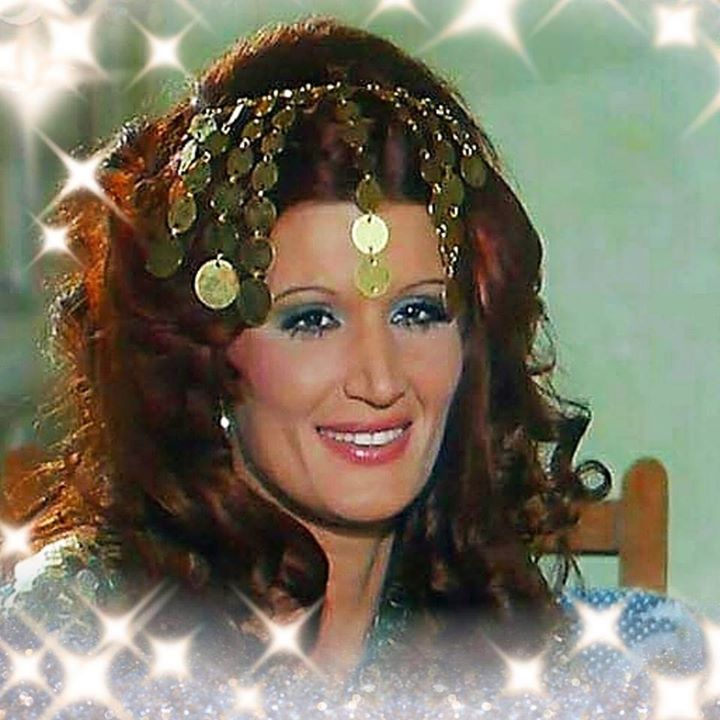
Q: You’re the only belly dancer who Abd El Halim Hafiz sang to, how would you describe your relationship with him? Also what’s the story behind that famous photo of you dancing and him drumming on a tambourine?
A: I am indeed the only dancer to dance in front of Abd El Halim Hafiz, and that was to the song “Qololo El Haqeeqa” (Tell Him the Truth) from the film “Share3 El Hob” (Love Street). I instantly agreed to become an extra in the film the moment I found out I was going to dance for Abd El Halim Hafiz and I even offered to work for free (I remember they gave me 5 pounds for the part). This part was a good luck charm, afterwards, I starred in “Malak w Shaytan” (Devil and Angel) alongside Rushdy Abaza and his daughter Mariam Fakher El Din. Ez El Din Zo El Fakar directed the film, and he brought in Abd El Rahim El Razqany and the head of the acting institute to help me prepare for the role. This dream team, which also had Ahmed Fouad Hassan, is what created the Nagwa Fouad that you know today. As for that photograph, all of us in the entertainment industry were like a big family and we would always get together during holidays such as Shem El Nessim. It was during these holidays when Abd El Halim Hafiz would sit on the floor and play the tambourine, and I would subsequently dance to the beat of the drum and the claps of those around us. Unfortunately, you can’t find this collective spirit in today’s stars, as most of them have superficial friendships made worse by the cacophony and abundance of smartphones.
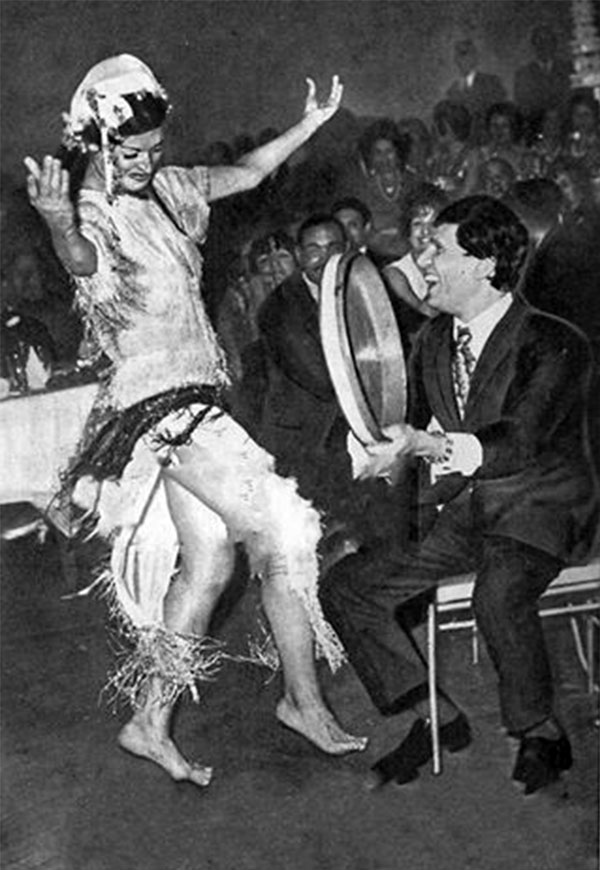
Q: Speaking of smartphones, are you active on social media?
A: I spend very little time on social media and only use during special occasions, or to contact friends. I also use it when I want to post a photo or scene of my work, or when I congratulate someone or console someone. I rather dislike such superficial methods of communication.
Q: What do you think distinguished you among the myriad of dancers from your time period?
A: The charisma I had and the sultry dance moves I presented could really catch people’s eyes. I also had my own performing ensemble that enabled me to do out of the box performances, for example, I once performed on a real-life horse. Imagine the look on the faces of the audience when a horse suddenly came on stage.
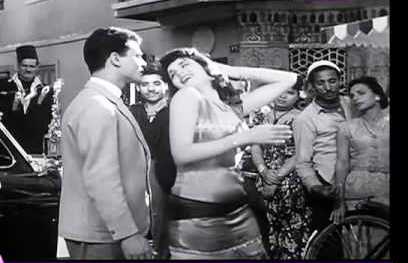
Q: Have you ever felt a rivalry between other performers in the field?
A: Rivalry drives success, but said rivalry should not be destructive. Competition is what leads to development and creativity, and luckily unhealthy competition didn’t exist during my day.
Q: What about the rumor regarding the jealousy between you and fellow belly dancer Sohier Zaki?
A: As I have said in the past, this is just a rumor and nothing more! I even produced something for her to work with me just to dispute the rumor. I produced a series of ensemble performances called “Maqtebat Nagwa Fouad” (Nagwa Fouad’s Office), and I insisted that Zaki participates in it and I made sure that the costume department make her the same outfits as mine and I also made sure that she had the same number of scenes as me.
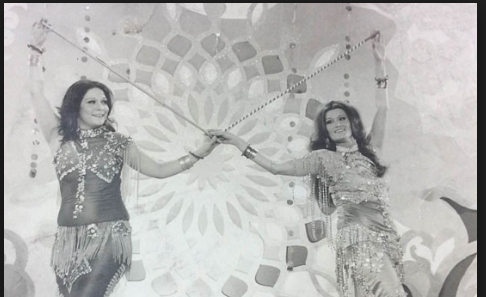
Q: How has your performances led to your connections to the crème de la crème of society?
A: The reason why I was able to interact with the echelon of society was that I never hid anything from my personal life to the public eye. I never fought with any of my colleagues, and I never harmed anyone. I never did anything to alienate myself from people, and I was lucky enough to perform in the weddings of notable politicians and individuals in Egyptian and Arab society. I was invited to perform at the weddings of both Abd El Nasser and Sadat’s children, respectively. American Presidents Nixon and Carter and various European leaders also came to see my shows.
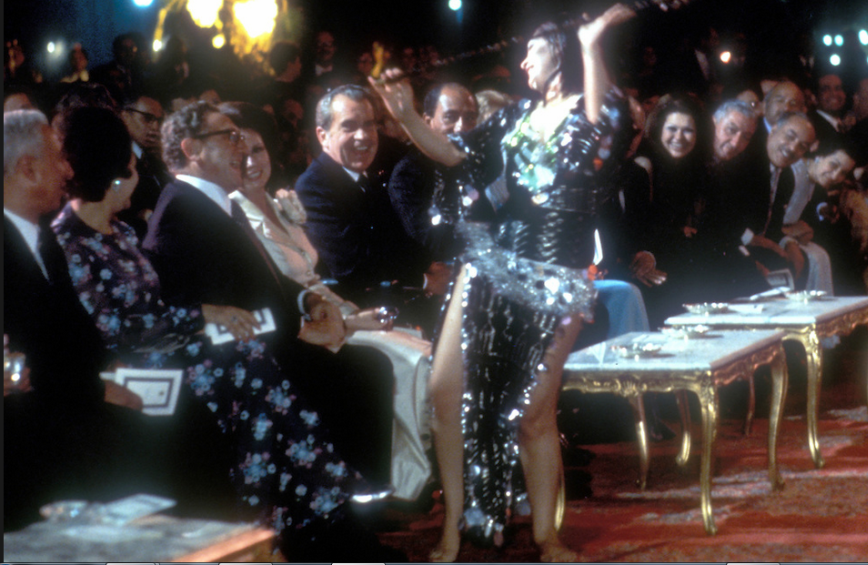
Q: Is it true that former US Secretary of State Henry Kissinger proposed to you? If so, why did you reject his marriage proposal?
A: After one of my shows, someone from the delegation of the US State Department told me that Henry Kissinger was watching my performance and he wanted to speak with me. I did not know who Kissinger was so the delegate told me and then he took me by the hand to meet the Secretary of State. My husband at the time, Sami El Zoghbi, was with me when I met Kissinger and because I did not know a word of English all I could say to Kissinger was “welcome to my country” and small phrases such as “bye-bye”.
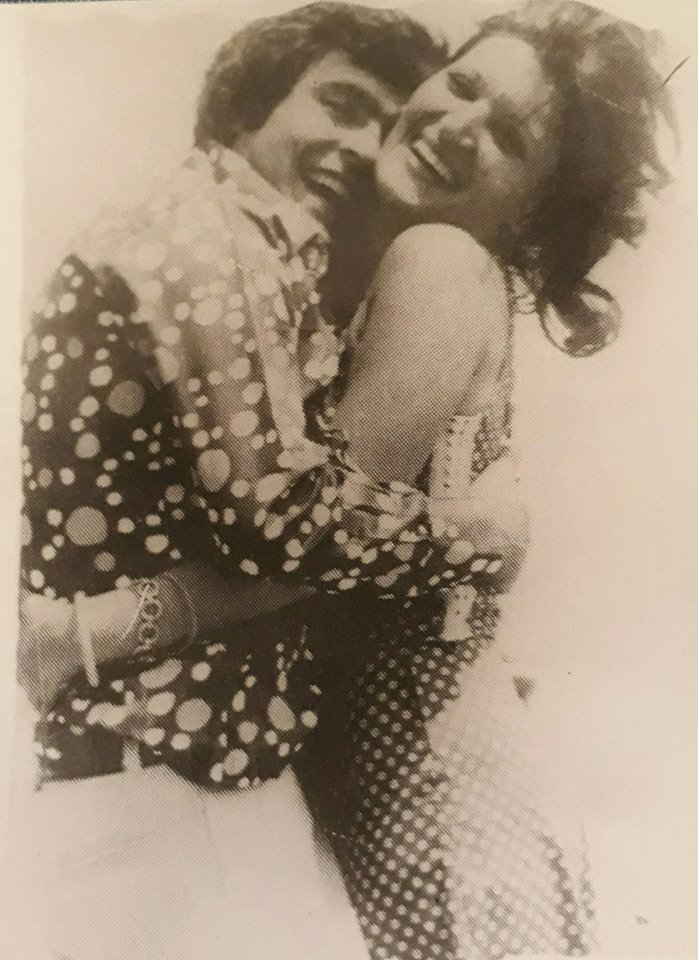
Q: Did he ask you to marry him?
A: Yes, and that is what he wanted to talk to me about. But I politely declined as I was married to Sami El Zoghbi who had converted to Islam just to marry me.
Q: Did you two meet again after that?
A: Yes, I saw him in the audience of one of my performances and I noticed that a tall woman who looked like me was accompanying him.
Q: So he chose someone that reminded him of you?
A: Yes, I believe so.
Q: Was he really that infatuated with you?
A: It’s not my fault, everyone knows the kind of shows I performed and I was responsible enough to not start any inappropriate relationships with one of my audience members.
Q: Do you know that he wrote about you in one of his books?
A: Believe or not, I only found out about this when I was watching Amr El Liethy’s talk show “Wahed Men El Nas” (One of the People) and he talked about Kissinger’s book which had an entire chapter about me. If it weren’t for El Liethy I would have no knowledge of this.
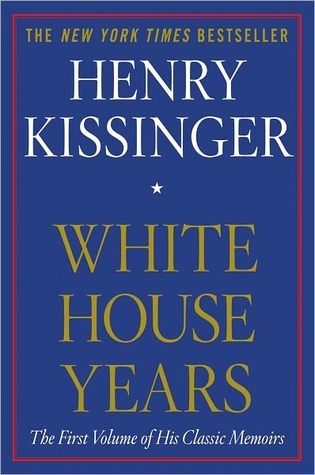
Q: How did you feel after finding out about that?
A: I was really happy knowing that I made my mark on this world as an Egyptian woman. I also found out that he was keen on knowing where my next performance was whenever he came to Egypt. Some of my friends also tell me that he still asks about me to this day.
Q: If there weren’t any obstacles on your way, would you have agreed to marry Kissinger?
A: If I wasn’t married at the time and he was willing to convert to Islam, then I would have married him. But, I doubt that he as major member of the US cabinet would have been willing to take such major steps for me.
Q: Why do belly dancers move from one marriage to the next?
A: I have never done that.
Q: They say that you’ve been married 12 times?!
A: When did that happen? I was always traveling for work, so I wouldn’t have the time for all these marriages. I only married six times, and one of those was an unregistered marriage. My last marriage was to Major General Mohammed Sibai, and that was a registered marriage. My other previous include that to Ahmed Fouad Hassan and El Zoghby. I also had a brief marriage to the actor Ahmed Ramzi, we had both signed the marriage contract but I had to go the US straight afterward to attend the opening ceremony of the TWA Flight Center. When I returned to Cairo, I found out he rekindled his relationship with his ex-wife and I ended our marriage on good terms and we remained good friends and colleagues.
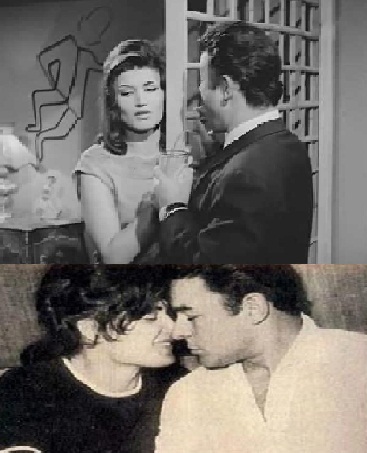
Q: What do you look for in men you think about marrying?
A: Ever since my last husband, Major General Mohammed Sibai, passed away I haven’t been thinking of marriage. In this day and age, finding a husband is hard since life is getting more expensive and money is limited, furthermore men today only think about the romantic side of the relationship and they do not want to share any responsibility. Also at my age, I am focused on other priorities such as God’s love, charity work and taking care of my health and home.
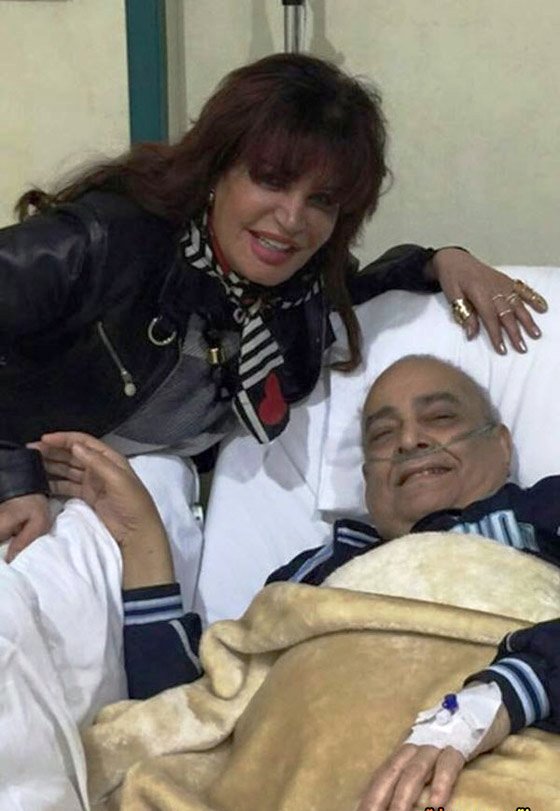
Q: Have you seen the film “El Raqesa w El Seyesy” (The Dancer and the Politician)? If so, what did you think of it?
A: Of course I have seen the film and I absolutely adored Nabila Abeid’s performance as the dancer. While it is true that Nelly was the best drama actress at the time, but I feel Abeid was best suited for the role as she is the best actress who could belly dance. Abied even told me that if she hadn’t married Atef Salem from a young age, she would have pursued a career in belly dancing.
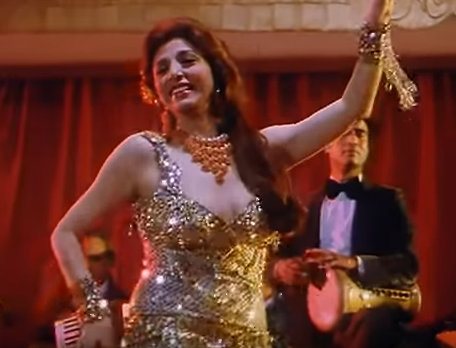
Q: Do you think the events depicted in the film are related to those in your life?
A: No, I have always stayed away from politics. The only politician I ever grew attached to was my late husband, Major General Mohamed Sibai who was the Interior Minister’s aid.
Q: Why have you steered clear from politics? Did you have a bad experience in the political sphere?
A: I even though I’m “pretty knowledgeable” in politics, it’s not my field and I do not enjoy talking about it. Even though, I relish listening to Dr. Mostafa El Faqy’s political lectures, I do not think that an entertainer should go into politics because at that point he or she will have to quit the industry to serve his or her country to the fullest.
Q: Which political era in Egypt did you enjoy the most?
A: The Sadat years are the nearest to my heart since he fully embraced artistic creativity. I would like to emphasize that such artistry can return in this day and age, but the economic crunch and revitalization has negatively impacted the country’s entertainment industry.
Q: Describe how you felt during the Egyptian Revolution.
A: As my building is near the Maspero building, I saw the protests and clashes first hand. I would often severely cough from black smoke, and I would hear gunshots and see fires on a daily basis. I was worried about the country, but thank God President El Sisi has reinstated security back in the country.
Q: You said in the past that there is respectful belly dancing and inappropriate belly dancing is that true?
A: Of course there is respectful belly dancing. Belly dancing today consists of scantily clad women, it’s all about eroticism. However, in the past belly dancing was an art form, and dancing ensemble performances looked like fine paintings.
Q: What do you think of current foreign belly dancers?
A: They have been working in Egypt since the days of Ismail Yassin and Anwar Wagdy, but they were used as background dancers. For instance you would find them dancing behind Layla Murad during musical scenes in films. Foreign belly dancers are talented but they do not have the same spirit of Eastern belly dancers. Foreign belly dancers also dress in revealing costumes, which is why I call for intervention in such cases in order to maintain cultural values.
Q: Do you have any regrets?
A: Perhaps the only regret I have is that I never got to experience motherhood and I had multiple abortions. However, when I think about my abortions I know I did the right thing since I wouldn’t want my children to feel neglected as I went about my busy life. I did, nonetheless, raise an orphan girl and made sure she continued her education. She is now a law graduate and is married with three children of her own. Even though she doesn’t visit me much, I don’t hold any grudges against her.
Q: There is a story of you wanting to marry the singer Emad Abd El Halim, do you feel sad that this never materialized?
A: This is one of my only regrets in life, it’s true that he asked for my hand in marriage but there were some aspects of his lifestyle that I did not like, additionally, I was eight years his senior. I deeply regretted not accepting his marriage proposal and punished myself for years afterwards.

Q: Tell us why you quit dancing and did that mark your farewell from the entertainment industry?
A: I am semiretired from the industry, if an acting role comes my way I would accept it. As for my decision to quit dancing, it came to one day as I was praying on my prayer mat and I afterwards I told my servants to gather my costumes and get rid of them. I disposed of all my dancing garments in 1997, and I gained peace of mind after making that decision. Sometimes I feel nostalgic when I listen to the music I danced to, but I know that my time is up and I am happy that I quit before hecklers would start mocking me on stage for my age.
Q: Tell us about the photo of you wearing the hijab, are you considering wearing it?
A: My friend took that photo after I finished praying the Maghreb prayer during the Ramadan before last. I was happy with peoples’ reaction to the photo and there is nothing I wish for more than to perform the Hajj.
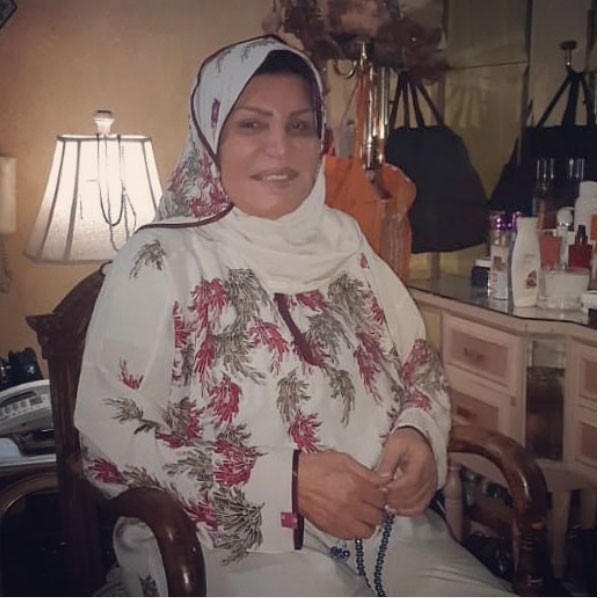
Q: What prevents you from going on the Hajj pilgrimage?
A: Nothing is stopping me from the Hajj, but I don’t have anyone to go with me and I can’t go alone. Also I don’t have the funds to go on the pilgrimage, but I pray to God that he makes me live long enough to go on the Holy journey.
Q: What are your fears now?
A: I am not afraid of death, but I am afraid of illnesses since I neither have children or people to care for me. I pray to God that I never get any debilitating illnesses.
Q: You have had many experiences throughout your life, would you ever compile them in a memoir?
A: I will not write a memoir, my mother died when I was young and I have few memories of my early childhood. I cannot verify the memories of that period, as there are small details in which I am uncertain of.







